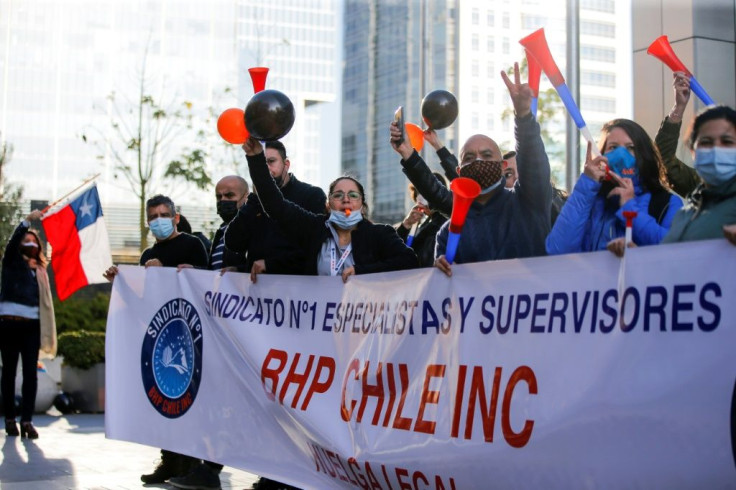Workers At World's Biggest Copper Mine In Chile Agree To Strike
Workers at the world's biggest copper mine, in Chile, have called a strike after rejecting a compensation offer by Anglo-Australian giant BHP.
The world's top producer of the mineral, Chile makes up 28 percent of global copper output, and the last time workers at the Escondida mine staged a major strike, in 2017, BHP lost $740 million.
Escondida workers are demanding a one-off bonus to recognize their work during the Covid-19 pandemic -- the equivalent of one percent of the dividends the company's shareholders made.
They are also asking for a career development plan and education benefits for their children.
In April, the price of copper reached a 10-year high of over $10,000 per ton, and the Escondida mine has projected revenues of more than $10 billion for this year.
Chilean media have reported that the company offered workers a bonus of some $23,000 each.
A vote late Saturday saw 99.5 percent of workers in favor of a strike, according to the Sindicato No 1 labor union, which said the offer "does not contain any advance in the legitimate demands of the workers."
The 2017 strike, which lasted for 44 days and was the longest in Chile's mining history, contributed to a 1.3-percent decline in GDP.

With annual production of some 5.6 million tons, copper accounts for 10-15 percent of the South American country's GDP, half its yearly exports and employs eight percent of the workforce.
Much of it goes to China, the world's biggest consumer.
Copper is an efficient conductor of electricity and heat, used widely in systems to generate power from solar, hydro, thermal and wind sources.
Mining and Energy Minister Juan Carlos Jobet had forecast production for 2021 to rise to 5.9 million tons from last year's 5.7 million, and to six million by 2022.
Union and company leaders can seek a final dialogue with government mediation within five to 10 days.
If they fail to reach an agreement, workers will embark on a strike at the open-pit mine in the region around Antofagasta, in the country's north, which produces about 1.1 million tons of the metal per year.
In a statement, BHP said it would seek mediation and remained open to dialogue.
"We hope that this strong vote is the decisive wake-up call for BHP to initiate substantive talks... if it wants to avoid an extensive conflict, which could be the most costly in the country's union history," said the union.
Chile is home to the world's main copper mines, mainly in the Atacama desert where the country's richest deposits are found.
© Copyright AFP {{Year}}. All rights reserved.




















